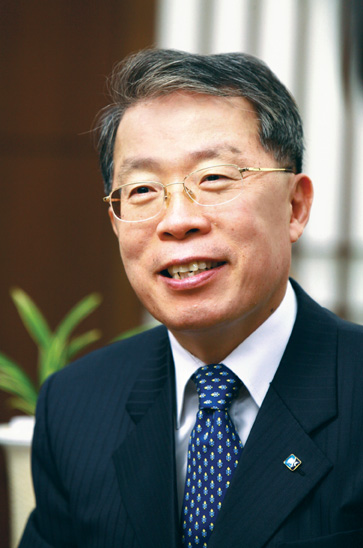Support for Green Growth Firms
Industrial Bank of Korea to provide 1 tln won in concessionary loans to companies in green growth zone
 The Industrial Bank of Korea (IBK) has set aside 1 trillion won in support of the green growth industry, whose development the government has been pushing, along with a number of other financial products in the green growth sector in a positive move to support the government¡¯s policy, the bank said recently.
The Industrial Bank of Korea (IBK) has set aside 1 trillion won in support of the green growth industry, whose development the government has been pushing, along with a number of other financial products in the green growth sector in a positive move to support the government¡¯s policy, the bank said recently.
The bank first introduced the financial product for businesses pursuing green growth in April last year, which has been provided to companies engaged in clean energy product manufacturing businesses such as wind & solar power and hybrid cars.
CEO Yun Yong-ro said the bank will utilize the credit guarantee issued by the Korea Credit Fund and the Korea Technology Credit Fund worth 200 billion won so SMEs can get loans with those guarantees as support. IBK will charge only 0.2 percent as a guarantee fee and allow 100 percent coverage of the loans with the guarantees.
Yun also said branch managers will have the right to approve loans to allow more financial support for firms in the green growth industry.
The bank will also launch ¡°green growth deposit¡± accounts to drum up publicity for green growth policies by paying the deposits 0.2 percent higher than the general deposit interest rate for individuals and 0.1 percent higher for corporate depositors. The bank will set aside 10 points for every 10,000 won in loans made to green growth companies so that the bank will be able to donate a maximum of 100 million won to the green growth organizations. The bank will also donate 1 percent of the deposit interest paid on the green growth deposits if the depositors want the green growth organizations named by the depositors.
President Yun said the bank will open 15 branches to deal exclusively with individual loans to achieve balance between corporate and private loans provided by IBK in the new year.
The IBK CEO said he will go to any length to expand personal loans even if he has to change operational practices, organizational culture and personnel policies. He said the bank¡¯s staff has a tendency to quit going after personal loan customers if one or two tries don¡¯t work because they have not been used to dealing with private clients, pledging that he will see that they stick with potential borrowers until they sign papers to take out loans.
He said the objective of his new management policy is aimed at making IBK healthier with the corporate loans whose default rate is four times higher than personal loans, as SMEs make up most of the business loan borrowers and their financials suffer when the economy is going through rough times.
However, he doesn¡¯t mean to cut down on loans to SMEs. In fact, the bank can still expand the funds intended for corporate loans. He plans to reduce the level of SME loans from the current 81 percent to 70 percent as stipulated in the IBK Law and ultimately to 60 percent if he can manage it.
On the outlook for the bank¡¯s operation this year, Yun said the bank is expected to regain its annual profit level before the financial crisis to 1 trillion won. He said the bank would incur a loss of about 50 billion won due to a 0.5 percentage point cut in the mortgage loan rate on Jan. 4, but can manage it without too much trouble. The move was intended to help reduce the burden on private borrowers, he said.
The CEO said IBK plans to expand its overseas operations down the road and recently dispatched a number of the bank¡¯s staff to Indonesia to look for a local bank for a merger, as it is much easier to acquire a local bank than it is to set up a wholly-owned subsidiary to quickly advance into the Southeast Asian country.
Established under the Industrial Bank of Korea (IBK) Act in 1961, the bank shares a special relationship with the Korean government. The bank¡¯s primary objective is to ¡°promote the independent economic activities of small and medium-sized enterprises (SMEs) and to enhance their economic position in the Korean economy.¡± Due to this public policy role, the government retains full control over the bank including the appointment of management, and the approval of budgetary and operation plans of the bank.
On Dec. 11, 2003, an amendment was made to the IBK Act, giving the bank more autonomy in its operations. Among other activities, the bank was allowed to invest in the equities and debt securities of SMEs and to set up budgeting requirements for general and administrative expenses besides labor costs. An additional amendment was made to the Articles of Incorporation of the Act on March 30, 2005, granting the bank the authority to utilize more diverse sources of capital. nw
President Yun Yong-ro of the Industrial Bank of Korea.
3Fl, 292-47, Shindang 6-dong, Chung-gu, Seoul, Korea 100-456
Tel : 82-2-2235-6114 / Fax : 82-2-2235-0799